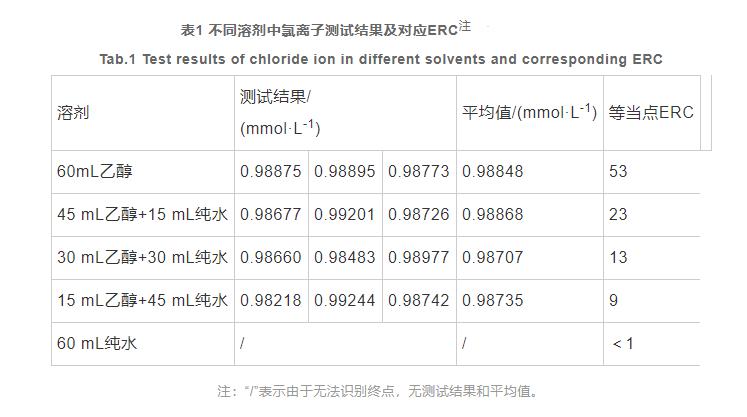- 欢迎来到新視角快報首页
许多化工产品对杂质氯的自动含量有严格的限制,以碳酸锂为例,电位滴定定电卤水碳酸锂规定优等品中的法测氯离子量≤0.05%,碳酸锂规定Li2CO3-0中的池级氯离子量≤0.01%,电池级碳酸锂规定氯离子量≤0.003%。碳酸
常见的锂中氯氯含量检测方法有滴定法、离子色谱法、痕量分光光度法、自动离子选择性电极法等。电位滴定定电其中电位滴定法是法测在滴定过程中通过测量电位变化以确定滴定终点的方法,电位滴定法不需要准确地测量电极电位值,池级因此温度、碳酸液体接界电位的锂中氯影响并不重要,其准确度较高。痕量相较于手工滴定法,自动电位滴定法具有以下优点:①无需加入指示剂,避免了实验人员判断终点颜色变化的主观因素误差;②减少了所需试剂溶液种类,节省试剂;③通过电极电位的突跃确定终点,杜绝了溶液本身的颜色对滴定终点判断的影响,抗干扰能力强。
无机化工产品中氯化物含量测定的通用方法-电位滴定法[4]以酸性的乙醇-水溶液为介质,用AgNO3标液滴定,借助于电位突跃确定反应终点。由于该标准适用的氯离子含量下限为0.01mg,无法满足电池级碳酸锂等高纯试样中痕量氯的测试要求,因此本文在该标准的基础上,对溶液总体积、溶剂、pH、滴定参数等进行了一系列优化实验,优化后的测试方法检出限为0.2876μg,碳酸锂中氯离子测试绝对误差在±0.0001%范围内,测试时间低于10min,测试效率高,并且电位滴定法与分光光度法的测试结果绝对差值≤0.0005%。此外,该方法也适用于氢氧化锂、硝酸铝等其他化学品中氯离子含量的测定。
1实验部分
1.1主要仪器与试剂
905型自动电位滴定仪、AgTitrode6.0430.100型银电极(瑞士万通中国有限公司);BS124S-120g型电子天平(德国赛多利斯公司);1mLEppendorfResearch@plus型移液枪(德国艾本德公司);PXSJ-216型离子计(上海仪电科学仪器股份有限公司);VE-20LH-A型纯水机(深圳市宏森环保科技有限公司)。
氯化钾(基准,天津市化学试剂研究所有限公司);浓硝酸(优级纯)、硝酸银(分析纯)、乙醇(分析纯)、氢氧化钠(分析纯)(国药集团化学试剂有限公司)。
除非另有说明,所有试剂均为分析纯及以上试剂,所用水为超纯水。
1.2溶液配制
0.10908mol/LKCl标液:用万分之一天平称取0.8132g预先在130℃下烘至恒重的基准氯化钾,置于100mL烧杯中,加水溶解后移入100mL容量瓶定容。
0.05454、0.01、0.001mol/LKCl标液:将0.10908mol/LKCl标液准确稀释至所需倍数。
1.3自动电位滴定仪工作参数
工作模式:DET-U动态电位滴定。
氯离子测试的滴定参数:滴定速度设置为“用户”,信号漂移10mV/min,滴定点密度4,最小加液递增2μL,最大加液递增30μL,加液速度为最大值;停止条件:停止体积3mL;电位评估:带体积(mL)窗口评估,下限0.3mL,上限9999mL,等当点识别标准20,等当点识别为最大。
AgNO3标液标定的滴定参数:滴定速度设置为最优。
1.4实验方法
AgNO3标液标定:移取1mL(0.01mol/L)KCl标液,置于100mL烧杯中,加1滴浓硝酸,加乙醇至60mL刻度。将待测溶液置于电位滴定仪自带的搅拌台上,并调整高度确保加液管和电极浸于溶液,搅拌桨不会触碰到加液管、电极和烧杯。在运行页面中选择AgNO3标定方法,输入KCl标液浓度及体积。参数设置完毕后进行测试,测得硝酸银的浓度,结果取3次测试的平均值,并在配置-滴定剂/溶液中更改AgNO3标液的浓度。
电位滴定氯离子测试:用称样纸采用差减法称取碳酸锂(1.0000±0.0020)g,样品放入100mL洗净干燥的烧杯中。用滴管向烧杯中缓慢滴加浓硝酸,摇晃烧杯加速溶解,滴至溶液澄清透明(无白色固体)。向烧杯中加入0.5mL(1mmol/L)KCl标准溶液,加乙醇至60mL刻度测试。
分光光度法:参照GB/T11064.10-2013,其中称样量为5.00g,定容至50mL,分取试液10mL。
离子计法:参照GB/T11064.15-2013进行氯离子测试,其中称样量为1.00g,定容至50mL,分取试液20mL。此外,标准中的盐酸替换为硝酸,氟标准溶液、氟电极替换为氯标准溶液、氯电极等。
氢氧化锂中的氯离子测试方法与碳酸锂相同,而硝酸铝由于其易溶于水,且其水溶液本身呈弱酸性,因此测试前加5mL水溶解即可。
1.5氯含量计算
按下式计算氯(以Cl计)的百分含量:

式中:V为滴定消耗的AgNO3标液体积,mL;V0为空白滴定消耗的AgNO3标液体积,mL;C为AgNO3标液的浓度,mol/L;VKCl为加入的KCl标液体积,mL;CKCl为KCl标液的浓度,mol/L;35.45为Cl的相对分子质量,g/mol;m为滴定试样的质量,g。
2结果与讨论
2.1溶剂对测试结果的影响
GB/T3050-2000中规定乙醇与溶液体积之比为3:1,总体积≤40mL。由于905电位滴定仪的搅拌桨比较大,因此结合实际情况,实验时将溶液总体积设定为60mL。用0.1mL(0.10908mol/L)KCl进行AgNO3标定,溶剂比例设置为60mL乙醇,45mL乙醇+15mL纯水,30mL乙醇+30mL纯水,15mL乙醇+45mL纯水,60mL纯水,分别测3个平行,记录测试结果及等当点ERC。
从表1可以看到,除了纯水作为溶剂电位滴定测试无法识别终点外,不同溶剂测试结果无明显差异。乙醇比例越高,等当点ERC越大(通过提高初始电位),终点选取更准确,测试误差越小。基于以上测试结果,前期高浓度氯离子溶液测试参照国标GB/T3050-2000将溶剂设置为45mL乙醇+15mL纯水。然而在进行碳酸锂测试时发现滴定终点突跃不明显,等当点ERC远低于AgNO3标液标定,因此最终将溶剂中的乙醇最大化(具体步骤见1.3),尽可能提高等当点ERC(EquivalencepointRecognitionCriterion,滴定曲线拐点的一阶微分),提高测试精度。

2.2pH对测试结果的影响
用硝酸和氢氧化钠溶液调节测试溶液(0.1mL(0.05454mol/L)KCl)的pH,考察溶液在不同pH下对测试结果的影响。从表2可以看到,当溶液超过pH11时,电位滴定测试无法识别终点,这是因为Ag+与OH-会反应生成Ag2O沉淀。pH<0.5或>9时,测试结果稍偏高,pH值在0~10之间,测试结果相对极差<5%,pH对测试结果的影响较小。结果表明氯离子测试最佳为pH0.5~8.0,适用范围广,而实际测试溶液通常为pH2.0~5.0,位于该范围内。
声明:本文所用图片、文字来源《化学试剂》,版权归原作者所有。如涉及作品内容、版权等问题,请与本网联系删除
相关链接:离子色谱法,硝酸银,氢氧化钠
(编辑:時代網)